From my name and profile picture, obviously I love this series. I would slob on the knob of every employee at Konami for even a crumb of (good) Suikoden. Having finally finished the entire series, I'd like to give my review of every game. Feel free to give your thoughts on the series as well!

Storytelling: Suikoden strays from the typical "Good vs Evil" plot of JRPGs and focuses on human conflicts and the ideological differences between key characters on how to save their nation from foreign threats. Despite having massive rosters, Suikoden is primarily character driven storytelling. The stakes are personal and conflicts have complex, interesting characters on both sides. I love the series for it's examination of leadership, sacrifice, and perseverance.
108 Stars of Destiny: Each game has 108 recruitable characters. Many are automatic at plot progression, and many are not. Recruitment serves three functions in Suikoden. The first is obviously to add to your battle party. With so many choices (though they are less diverse in earlier titles), you'll be able to form any party from OP to meme to whatever characters you think are the coolest, and everything in between. Some characters provide a service at your home base that is ever expanding with new recruits. You'll have access to every type of shop with every item you've ever seen in the game, as well as game changing options (menu window styles and sounds) and even mini games. Some of these mini games are VERY involved such as the Suikoden 2 cooking game and the Suikoden 3 stage plays. These games are packed with so much extra shit that many players may have never even touched. The third function of recruitment is covered in War Battles.
Gameplay: Suikoden, aside from S4, features a 6 character party compared to the typical 3-4 in JRPGs. There are a few extra layers of strategies as well. There are 2 rows that takes into account a characters attack range. A character with S range can only perform a normal attack from the front row. M range can attack from the back row, but can only attack the enemies front row. L can attack from the back row and attack the enemies back row. Characters have physically focused stats, magical, or a balance of both. They have 1-3 rune slots that determine how the character functions. Physical runes usually increase attacking power, critical chance, or give statuses that boost attack power. Magical runes govern what type of spells the character can cast. Some characters have unequipable unique runes that make them stand out from all the other characters (or make them a worse character by having a rune slot filled with something useless). There are some addtional mechanicals, but from this alone you can imagine the freedom in creating a fun party.
War Battles: Each game features a strategic war battle between armies. Every game has a COMPLETELY different version of it. Some are better than others, but all are at worst a fun diversion from the other mechanics. This is another component of the game that is affected by recruitment. The more characters you have, the bigger your army. But it's not just size. Some characters provide unique abilities, such as spying to find out the enemies actions (Suikoden 1), or adding special selectable abilities to a squad (Suikoden 5).
Continuous Storyline: Every game features it's own conflict, taking place before or after the events of another game. Some characters from previous games return, but they are there to support the events from the current game. However, each game has bits and pieces of lore pointing towards a grand culmination of many loose ends. Search up Suikoden fan theories and you'll find a ton of discussion. Konami created an incredible world with a lot of mystery and intrigue. Each game adds something to the overall discussion that we all want answers to.
DISCLAIMER: This review is based on the ORIGINAL PS1 versions of Suikoden 1 and 2. The remasters look great, and I've heard positive things about them. I like to import my save files from 1-3 when I'm doing a series playthrough, so until that's possible with the remasters, I'm sticking with the originals. I will try to have as little spoilers as possible, but we'll see where the wind takes me.

The first game in the series starts out strong. Some might consider it short, I'd call it well paced. It holds up as well as any of the others in most departments but lacks many quality of life features that will likely frustrate new players. The freedom of party creation is also at it's worst in this game as well as having the most generic fantasy setting, as I'll discuss below. However, the characters are well made and the storytelling is captivating. Characters aren't mindless soldiers in your army, but have their own thoughts and desires, which creates meaningful conflicts and resolutions. This isn't a game I would recommend to everyone, unlike some future titles, but if you have patience for older games and have never tried Suikoden 1, you absolutely should.
++ Music: Easily the best part of the original game. Nearly all of the iconic musical motifs and thematic sounds present in the series were created for this game.
Listening to this track evokes so much emotion and memory. If you get into this series, this song will forever hold a special place in your heart.
+ Graphics: The decision to not jump into the early 3D craze of the PS1 has helped this game age gracefully. The sprites are absolutely beautiful, and the tilesets are mostly pretty good. The battle animations are decent but the rune animations are incredible, especially for the main characters special rune: the Soul Eater. I personally love the character portraits. The unique art style really resonates with me. This is one of the areas I actually don't like about the remasters: the portraits are kind of bland.
+ Story: This game features the classic "Rebel vs Empire" framing. (I know I know, I really hyped it up before. But the story is much more than the sum of it's parts). The main character Tir is the son of a powerful general in the Empire, and through viewing the corruption and misdeeds of it's army, he joins the rebel army as it's leader. He receives a powerful True Rune from his dying friend, the Soul Eater, that is more of a curse than a gift. It consumes the souls of his friends that die around him and no longer allows him to age. Through this, the game explores the toll of leadership (sacrifice, betrayal, and difficult decisions). The moment to moment storytelling is fantastic and will be the driving force for the player's interest in the game, despite the generic setting and framing. There is no filler in this game. It's fast paced and delivers a full, satisfying arc.
+ War Battles: The first attempt at war battles is actually pretty good. Functionally, it's a rock paper scissors game where certain squad types beat other squad types(Melee, Range, Magic). As the game progresses, you'll get some abilities that aren't combat related, such as healing and reconnaissance. Is this going to blow you away? No, but it does just enough to be interesting.
= Gameplay: Combat is at it's most barebones in Suikoden 1, but it does the job. I wouldn't consider it a negative for the game, as most of the positives I wrote in the general gameplay section apply here. However, in this title only, each character has one single rune slot. So if a character comes with an unequipable rune, that's all they can ever have. A lot of characters are also straight palette swaps with minor changes. Pahn and Morgan are basically the same character, but Pahn has story relevance and consequences, so why would you ever use Morgan? This is much improved in future games.
= Setting: I'm not sure if I'll even mention the setting in other sections, but here it needs to be said. This is a humans elves and dwarves world with knights and wizards and shit. The elves are snooty and want nothing to do with you and the Dwarves like to collect objects and invent a bunch of stuff. I put it as neutral because I don't believe it detracts from the experience, but it's also nothing worth praising. Future games are much more creative and feature many different unique races.
What Makes Suikoden Great? (Post1/5)
Storytelling: Suikoden strays from the typical "Good vs Evil" plot of JRPGs and focuses on human conflicts and the ideological differences between key characters on how to save their nation from foreign threats. Despite having massive rosters, Suikoden is primarily character driven storytelling. The stakes are personal and conflicts have complex, interesting characters on both sides. I love the series for it's examination of leadership, sacrifice, and perseverance.
108 Stars of Destiny: Each game has 108 recruitable characters. Many are automatic at plot progression, and many are not. Recruitment serves three functions in Suikoden. The first is obviously to add to your battle party. With so many choices (though they are less diverse in earlier titles), you'll be able to form any party from OP to meme to whatever characters you think are the coolest, and everything in between. Some characters provide a service at your home base that is ever expanding with new recruits. You'll have access to every type of shop with every item you've ever seen in the game, as well as game changing options (menu window styles and sounds) and even mini games. Some of these mini games are VERY involved such as the Suikoden 2 cooking game and the Suikoden 3 stage plays. These games are packed with so much extra shit that many players may have never even touched. The third function of recruitment is covered in War Battles.
Gameplay: Suikoden, aside from S4, features a 6 character party compared to the typical 3-4 in JRPGs. There are a few extra layers of strategies as well. There are 2 rows that takes into account a characters attack range. A character with S range can only perform a normal attack from the front row. M range can attack from the back row, but can only attack the enemies front row. L can attack from the back row and attack the enemies back row. Characters have physically focused stats, magical, or a balance of both. They have 1-3 rune slots that determine how the character functions. Physical runes usually increase attacking power, critical chance, or give statuses that boost attack power. Magical runes govern what type of spells the character can cast. Some characters have unequipable unique runes that make them stand out from all the other characters (or make them a worse character by having a rune slot filled with something useless). There are some addtional mechanicals, but from this alone you can imagine the freedom in creating a fun party.
War Battles: Each game features a strategic war battle between armies. Every game has a COMPLETELY different version of it. Some are better than others, but all are at worst a fun diversion from the other mechanics. This is another component of the game that is affected by recruitment. The more characters you have, the bigger your army. But it's not just size. Some characters provide unique abilities, such as spying to find out the enemies actions (Suikoden 1), or adding special selectable abilities to a squad (Suikoden 5).
Continuous Storyline: Every game features it's own conflict, taking place before or after the events of another game. Some characters from previous games return, but they are there to support the events from the current game. However, each game has bits and pieces of lore pointing towards a grand culmination of many loose ends. Search up Suikoden fan theories and you'll find a ton of discussion. Konami created an incredible world with a lot of mystery and intrigue. Each game adds something to the overall discussion that we all want answers to.
DISCLAIMER: This review is based on the ORIGINAL PS1 versions of Suikoden 1 and 2. The remasters look great, and I've heard positive things about them. I like to import my save files from 1-3 when I'm doing a series playthrough, so until that's possible with the remasters, I'm sticking with the originals. I will try to have as little spoilers as possible, but we'll see where the wind takes me.
Post automatically merged:
Suikoden 1 (Post 2/5)
The first game in the series starts out strong. Some might consider it short, I'd call it well paced. It holds up as well as any of the others in most departments but lacks many quality of life features that will likely frustrate new players. The freedom of party creation is also at it's worst in this game as well as having the most generic fantasy setting, as I'll discuss below. However, the characters are well made and the storytelling is captivating. Characters aren't mindless soldiers in your army, but have their own thoughts and desires, which creates meaningful conflicts and resolutions. This isn't a game I would recommend to everyone, unlike some future titles, but if you have patience for older games and have never tried Suikoden 1, you absolutely should.
++ Music: Easily the best part of the original game. Nearly all of the iconic musical motifs and thematic sounds present in the series were created for this game.
+ Graphics: The decision to not jump into the early 3D craze of the PS1 has helped this game age gracefully. The sprites are absolutely beautiful, and the tilesets are mostly pretty good. The battle animations are decent but the rune animations are incredible, especially for the main characters special rune: the Soul Eater. I personally love the character portraits. The unique art style really resonates with me. This is one of the areas I actually don't like about the remasters: the portraits are kind of bland.
+ Story: This game features the classic "Rebel vs Empire" framing. (I know I know, I really hyped it up before. But the story is much more than the sum of it's parts). The main character Tir is the son of a powerful general in the Empire, and through viewing the corruption and misdeeds of it's army, he joins the rebel army as it's leader. He receives a powerful True Rune from his dying friend, the Soul Eater, that is more of a curse than a gift. It consumes the souls of his friends that die around him and no longer allows him to age. Through this, the game explores the toll of leadership (sacrifice, betrayal, and difficult decisions). The moment to moment storytelling is fantastic and will be the driving force for the player's interest in the game, despite the generic setting and framing. There is no filler in this game. It's fast paced and delivers a full, satisfying arc.
+ War Battles: The first attempt at war battles is actually pretty good. Functionally, it's a rock paper scissors game where certain squad types beat other squad types(Melee, Range, Magic). As the game progresses, you'll get some abilities that aren't combat related, such as healing and reconnaissance. Is this going to blow you away? No, but it does just enough to be interesting.
= Gameplay: Combat is at it's most barebones in Suikoden 1, but it does the job. I wouldn't consider it a negative for the game, as most of the positives I wrote in the general gameplay section apply here. However, in this title only, each character has one single rune slot. So if a character comes with an unequipable rune, that's all they can ever have. A lot of characters are also straight palette swaps with minor changes. Pahn and Morgan are basically the same character, but Pahn has story relevance and consequences, so why would you ever use Morgan? This is much improved in future games.
= Setting: I'm not sure if I'll even mention the setting in other sections, but here it needs to be said. This is a humans elves and dwarves world with knights and wizards and shit. The elves are snooty and want nothing to do with you and the Dwarves like to collect objects and invent a bunch of stuff. I put it as neutral because I don't believe it detracts from the experience, but it's also nothing worth praising. Future games are much more creative and feature many different unique races.

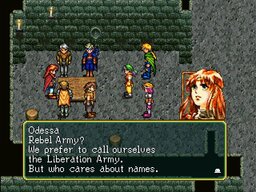
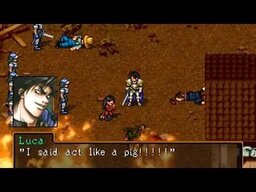
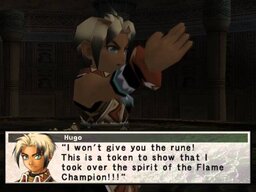
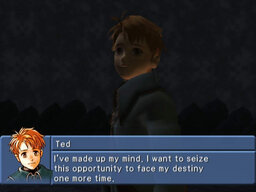
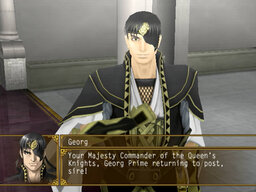
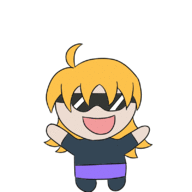

 it's like an article at this point lmao
it's like an article at this point lmao it. But yea, 1&2 have always been on my backlog
it. But yea, 1&2 have always been on my backlog  so that's probably why I was unaware, since 3 was my first suikoden game.
so that's probably why I was unaware, since 3 was my first suikoden game.



